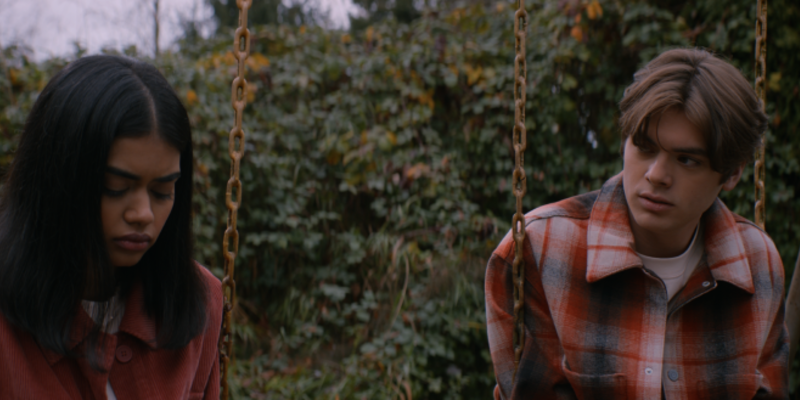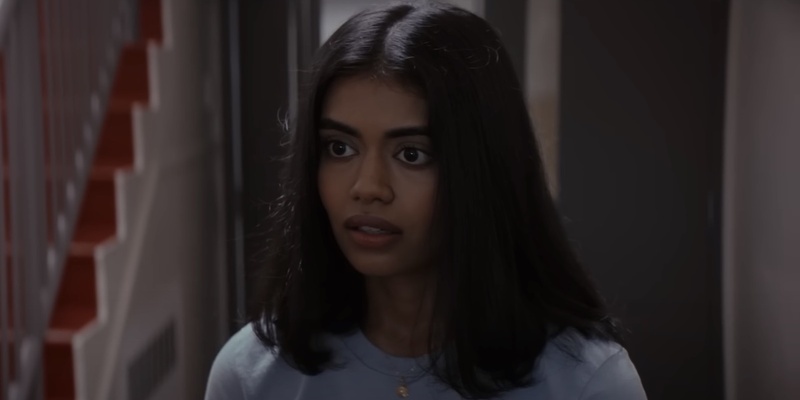
Review by
Eric Hillis
Directed by: Bishal Dutta
Starring: Megan Suri, Neeru Bajwa, Mohana Krishnan, Vik Sahay, Betty Gabriel

Every culture has its own brand of demonic folklore but there's a large
overlap across the world's faiths that represents universal fears.
Writer/director Bishal Dutta draws on childhood tales relayed by
his Indian grandmother for his feature debut,
It Lives Inside, but the demonic antagonist is a variation of others we've seen in
horror movies from across the globe. It feeds on fear and dark thoughts,
an idea we've seen as recently as the Stephen King adaptation
The Boogeyman. Something else that's universal is the struggle of teenage girls to
fit in with their peers, especially if they're considered "different" in
any way.
Samidha (Megan Suri) differs from her peers because she's an
Indian teen in a white American suburb. Her attempts to distance herself
from her parents' culture is first illustrated by her use of a skin
lightening tool after taking a selfie. When her mother, Poorna (Neeru Bajwa, who looks more like Suri's big sister), speaks Hindi at the breakfast
table, Samidha, who prefers to be called Sam, replies in English. Sam
frowns when she's asked to participate in an upcoming religious
ceremony, and the influence of western feminism has caused her to resent
her mother for happily playing the traditional role of a stay at home
housewife.

At school, Sam is patronised and condescended to by teachers and
students alike. There's nothing malicious about how she's treated, but
she's othered by the white pupils who use her ability to speak another
language to create amusing Tik Tok videos and ask her for help with
their maths homework. Joyce, a kindly black teacher played by
Betty Gabriel, is well meaning yet patronising, and when the only
other Indian kid in school, Tamira (Mohana Krishnan), starts
behaving strangely, Joyce assumes Sam might know what's up with
her.
While Sam rejects this presumption, she actually was once friends with
Tamira, but dropped her so she could fit in with the local white kids.
Now Tamira is a loner who dresses like a goth. But there's more to
Tamira's isolation. She carries around a jar which she claims houses the
spirit of the Pishach, a demon from Hindi mythology that latches onto
dark feelings and in the case of Tamira, loneliness. Lashing out at
Tamira, Sam shatters the jar, unleashing a thick plume of smoke. When
Tamira subsequently disappears and Sam starts having vivid nightmares,
she begins to worry she might have released something worse than a few
fumes from the jar.
Like its protagonist, It Lives Inside is torn between two
cultures. It follows the well worn tropes of the American teen horror
while injecting elements of Indian folklore. Too often the latter is
spoken of rather than put on display, and the amount of exposition
regarding Indian mythology tells you the movie wants to make sure it
doesn't isolate its primary western audience.

When Dutta does veer away from the lessons on folklore he creates some
decent set-pieces. The best of the bunch sees Joyce menaced by an unseen
presence in her school after hours. Dutta makes good use of the always
unsettling effect of motion sensor lights turning on seemingly by
themselves, but what's interesting about the sequence is that Joyce
doesn't share Sam's particular belief in the Pishach, but like they say,
there are no atheists in foxholes, or in creepy school corridors.
With her expressive eyes tasked with conveying much of Sam's terror,
Suri helps to ground the film and coalesce the culturally specific tale
into a universally recognisable story of teenage angst. Bajwa is very
good as her mother, and there are touching moments late on as the two
bond despite accepting that they're essentially products of two very
different cultures.

At a certain point It Lives Inside begins to strain
credulity however. Not with its supernatural elements but with its
representation of how this scenario would play out in real life. When
Sam's white boyfriend is killed by an unseen spirit in her presence,
Dutta gives us a shot of a group of white folks giving Sam and her
parents the evil eye, yet there's no follow-up to this. We never see how
she's subsequently treated in school, and neither the police nor her
parents display any interest in interrogating Sam about the
incident.
Of course, if you're a seasoned horror fan you'll have learned to shrug
off such inconsistencies and settle in for the thrills, of which there
are just about enough here to make It Lives Inside an
entertaining teen horror.

